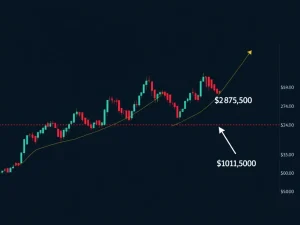Urgent: Solana DeFi Protocol Loopscale Suffers $5.8M Hack

News broke recently about a significant security incident affecting a key player in the Solana DeFi ecosystem. Loopscale, a decentralized finance lending protocol, has temporarily halted its lending operations following an exploit that resulted in substantial losses.
Understanding the Loopscale Hack
On April 26, the Loopscale hack occurred, leading to the siphoning of approximately $5.8 million in digital assets. According to Loopscale co-founder Mary Gooneratne, the attacker managed to withdraw about 5.7 million USDC and 1200 Solana (SOL) tokens. The method used involved taking out a series of undercollateralized loans, a complex maneuver that bypassed the protocol’s intended safeguards.
This exploit specifically impacted Loopscale’s USDC and SOL vaults. The total loss represents roughly 12% of the protocol’s total value locked (TVL).
Impact on DeFi Lending and Protocol Status
Following the incident, Loopscale immediately paused its DeFi lending markets. The team has since managed to restore some core functionalities, specifically loan repayments, top-ups, and the closing of existing loops. However, other critical features, including vault withdrawals, remain disabled as the investigation continues.
The Loopscale team has stated they are fully focused on investigating the exploit, attempting fund recovery, and implementing measures to protect users moving forward.
Context: Crypto Hack Trends
This incident adds to the broader landscape of security challenges within the crypto space. While the crypto hack on Loopscale is significant, it follows a trend of exploits seen across the industry. Blockchain security firms have reported billions lost to hacks in the first quarter of 2025 alone, highlighting the persistent need for robust security measures in both centralized and decentralized platforms.
Loopscale’s Unique Position in Solana DeFi
Launched earlier in April after a beta phase, Loopscale aimed to innovate within the Solana DeFi space. Unlike many lending protocols that use pooled liquidity, Loopscale operates on an order book model designed to directly match lenders and borrowers, potentially enhancing capital efficiency. It also supports specialized lending markets beyond standard overcollateralized loans.
Despite its recent launch, the protocol had already attracted a notable user base and TVL, supporting markets for various tokens including JitoSOL and BONK.
Summary
The $5.8 million Loopscale hack is a serious event for the protocol and the broader Solana DeFi ecosystem. While the team has partially restored functionality for existing loans, the pause on other operations underscores the severity of the exploit involving undercollateralized loans. As the investigation into this crypto hack continues, the focus remains on understanding how the vulnerability was exploited and preventing future incidents to ensure the safety of DeFi lending platforms.






